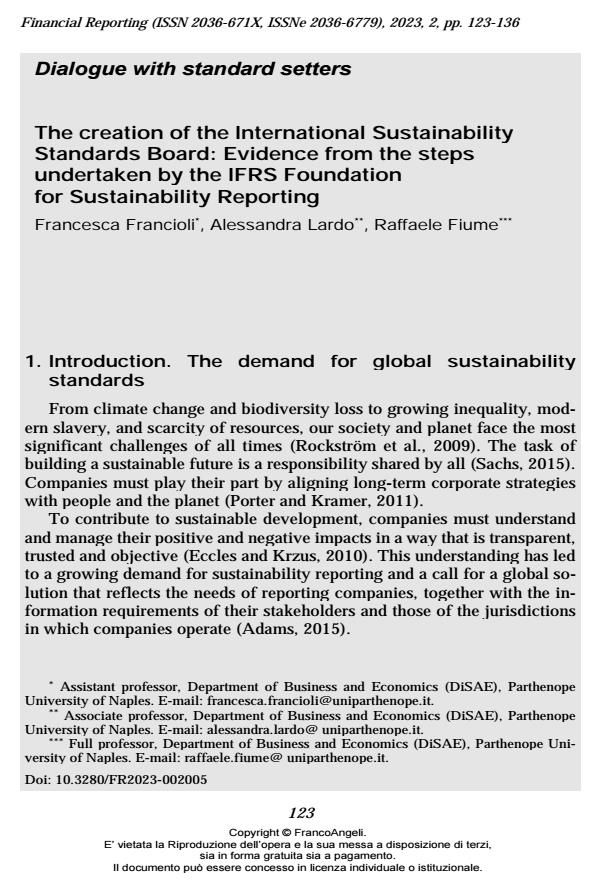Dialogue with standard setters. The creation of the International Sustainability Standards Board: Evidence from the steps undertaken by the IFRS Foundation for Sustainability Reporting
Titolo Rivista FINANCIAL REPORTING
Autori/Curatori Francesca Francioli, Alessandra Lardo, Raffaele Fiume
Anno di pubblicazione 2023 Fascicolo 2023/2
Lingua Inglese Numero pagine 14 P. 123-136 Dimensione file 105 KB
DOI 10.3280/FR2023-002005
Il DOI è il codice a barre della proprietà intellettuale: per saperne di più
clicca qui
Qui sotto puoi vedere in anteprima la prima pagina di questo articolo.
Se questo articolo ti interessa, lo puoi acquistare (e scaricare in formato pdf) seguendo le facili indicazioni per acquistare il download credit. Acquista Download Credits per scaricare questo Articolo in formato PDF

FrancoAngeli è membro della Publishers International Linking Association, Inc (PILA)associazione indipendente e non profit per facilitare (attraverso i servizi tecnologici implementati da CrossRef.org) l’accesso degli studiosi ai contenuti digitali nelle pubblicazioni professionali e scientifiche
- Sikka P. (2002). The politics of restructuring the standard setting bodies: the case of the UK’s auditing practices board. Accounting Forum, 26(2), pp. 97-125.
- Adams C.A. (2015). The International Integrated Reporting Council: A call to action, Critical Perspectives on Accounting, 27, pp. 23-28.
- Afolabi H., Ram R. and Rimmel G. (2023). Influence and behaviour of the new standard setters in the sustainability reporting arena: implications for the Global Reporting Initiative’s current position. Sustainability Accounting, Management and Policy Journal, 14(4), pp. 743-775.
- Amel-Zadeh A. and Serafeim G. (2018). Why and how investors use ESG information: Evidence from a global survey. Financial Analysts Journal, 74(3), pp. 87-103.
- Barth M.E., Cahan S.F., Chen L. and Venter E.R. (2017). The economic consequences associated with integrated report quality: Capital market and real effects. Accounting, Organizations and Society, 62, pp. 43-64.
- Baumüller J. and Sopp K. (2022), Double materiality and the shift from non-financial to European sustainability reporting: review, outlook and implications. Journal of Applied Accounting Research, 23(1), pp. 8-28.
- Bengtsson E. (2011). Repoliticalization of accounting standard setting. Critical Perspectives on Accounting, 22(6), pp. 567-580.
- Broadbent J. and Laughlin R. (2002). Accounting choices: technical and political trade-offs and the UK private finance initiative. Accounting, Auditing & Accountability Journal, 15(5), pp. 622-654.
- Busch T., Bauer R. and Orlitzky M. (2016). Sustainable development and financial markets: Old paths and new avenues. Business & Society, 55(3), pp. 303-329.
- Churet C. and Eccles R.G. (2014). Integrated reporting, quality of management, and financial performance. Journal of Applied Corporate Finance, 26(1), pp. 56-64.
- Contrafatto M., Ferguson J., Power D., Stevenson L. and Collison D. (2020). Understanding power related strategies and initiatives: the case of the European commission green paper on CSR. Accounting, Auditing & Accountability Journal, 33(3), pp. 559-587.
- Cooper D.J. and Sherer M.J. (1984). The value of corporate accounting reports: arguments for a political economy of accounting. Accounting, Organizations and Society, 9(3-4), pp. 207-232.
- Cousins J. and Sikka P. (1993). Accounting for change: facilitating power and accountability. Critical Perspectives on Accounting, 4, pp. 53-72.
- Dhaliwal D.S., Li O.Z., Tsang A. and Yang Y.G. (2011). Voluntary nonfinancial disclosure and the cost of equity capital: The initiation of corporate social responsibility reporting. The Accounting Review, 86(1), pp. 59-100.
- Durocher S., Fortin A. and Cote L. (2007). Users’ participation in the accounting standard-setting process: a theory-building study. Accounting, Organizations and Society, 32(1-2), pp. 33-63.
- Eccles R.G. and Krzus M.P. (2010). One report: Integrated reporting for a sustainable strategy. (John Wiley & Sons).
- Eccles R.G. and Saltzman D. (2017). Achieving sustainability through integrated reporting. Stanford Social Innovation Review.
- Eccles R.G. and Serafeim G. (2013). The performance frontier. Harvard Business Review, 91(5), pp. 50-60.
- Eccles R.G., Ioannou I. and Serafeim G. (2014). The impact of corporate sustainability on organizational processes and performance. Management Science, 60(11), pp. 2835-2857.
- Friede G., Busch T. and Bassen A. (2015). ESG and financial performance: Aggregated evidence from more than 2000 empirical studies. Journal of Sustainable Finance & Investment, 5(4), pp. 210-233.
- Goss A. and Roberts G.S. (2011). The impact of corporate social responsibility on the cost of bank loans. Journal of Banking & Finance, 35(7), pp. 1794-1810.
- Grewal J., Riedl E.J. and Serafeim G. (2019). Market reaction to mandatory nonfinancial disclosure. Management Science, 65(7), pp. 2947-3448.
- Hahn R. and Kühnen M. (2013). Determinants of sustainability reporting: a review of results, trends, theory, and opportunities in an expanding field of research. Journal of Cleaner Production, 59, pp. 5-21.
- Krzus M.P. (2011). Integrated reporting: If not now, when? IRZ, 6(2), pp. 92-94.
- Leuz C. and Wysocki P.D. (2016). The economics of disclosure and financial reporting regulation: Evidence and suggestions for future research. Journal of Accounting Research, 54(2), pp. 525-622.
- Mattli W. and Buthe T. (2003). Setting international standards: technological rationality or primacy of power. World Politics, 56(1), pp. 1-42.
- Porter M.E. and Kramer M.R. (2011). Creating shared value. Harvard Business Review, 89(1/2), pp. 62-77.
- Rockström J. et al. (2009). A safe operating space for humanity. Nature, 461(7263), pp. 472-475.
- Rossi F. (2022). La sfida inevitabile. La sostenibilità e il futuro dell’impresa. (il Mulino).
- Rowbottom N. (2023). Orchestration and consolidation in corporate sustainability reporting. The legacy of the Corporate Reporting Dialogue. Accounting, Auditing & Accountability Journal, 36(3), pp. 885-912.
- Sachs J. (2015). The age of sustainable development. (Columbia University Press).
- Serafeim G. (2021). Public sentiment and the price of corporate sustainability. Financial Analysts Journal, 77(2), pp. 85-107.
- Stolowy H. and Paugam L. (2023). Sustainability reporting: is convergence possible? Accounting in Europe, 20(2), pp. 139-165.
- Developing a framework for the improvement of stakeholder management plans Blessing Dirani, Ranzi Mazenge Rusike, David Damiyano, Josphat Nyoni, in International Journal of Research in Business and Social Science (2147- 4478) /2025 pp.108
DOI: 10.20525/ijrbs.v14i7.4317
Francesca Francioli, Alessandra Lardo, Raffaele Fiume, Dialogue with standard setters. The creation of the International Sustainability Standards Board: Evidence from the steps undertaken by the IFRS Foundation for Sustainability Reporting in "FINANCIAL REPORTING" 2/2023, pp 123-136, DOI: 10.3280/FR2023-002005